牛津版高中英语 必修2 Unit 1 Tales of the unexplained 本单元重要词组课件 ( 共67张)
文档属性
| 名称 | 牛津版高中英语 必修2 Unit 1 Tales of the unexplained 本单元重要词组课件 ( 共67张) |
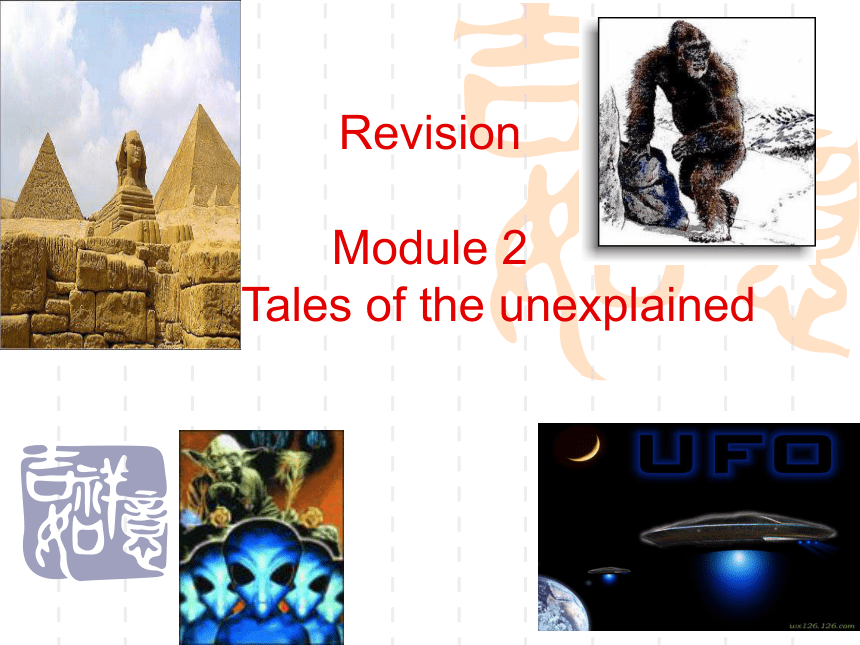
|
|
| 格式 | zip | ||
| 文件大小 | 3.3MB | ||
| 资源类型 | 教案 | ||
| 版本资源 | 牛津译林版 | ||
| 科目 | 英语 | ||
| 更新时间 | 2019-04-10 22:39:46 | ||
图片预览

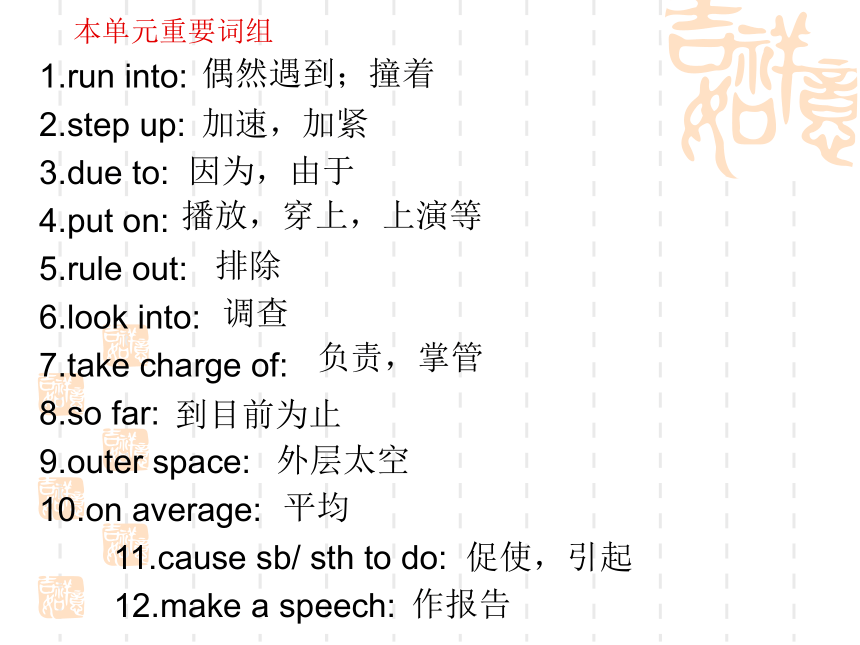
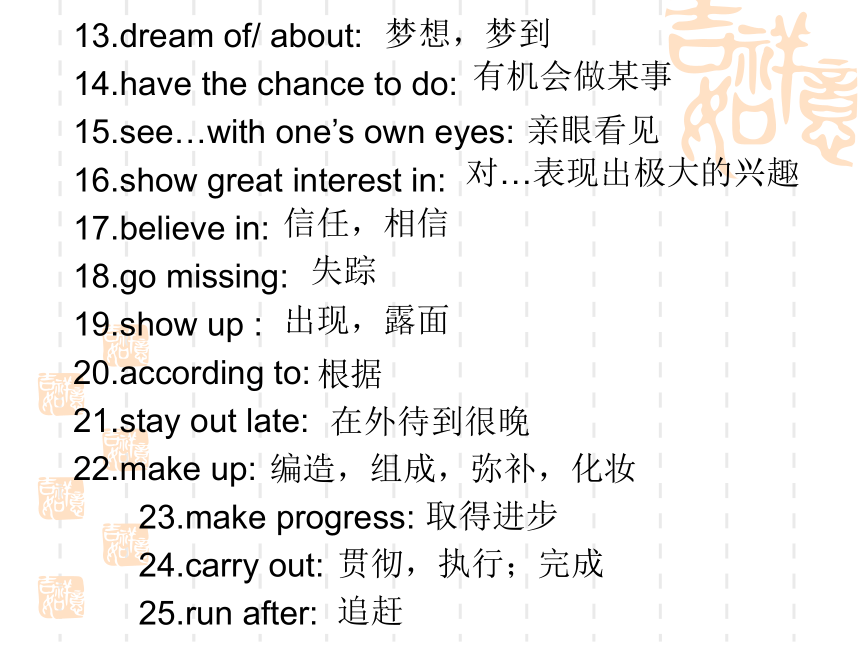
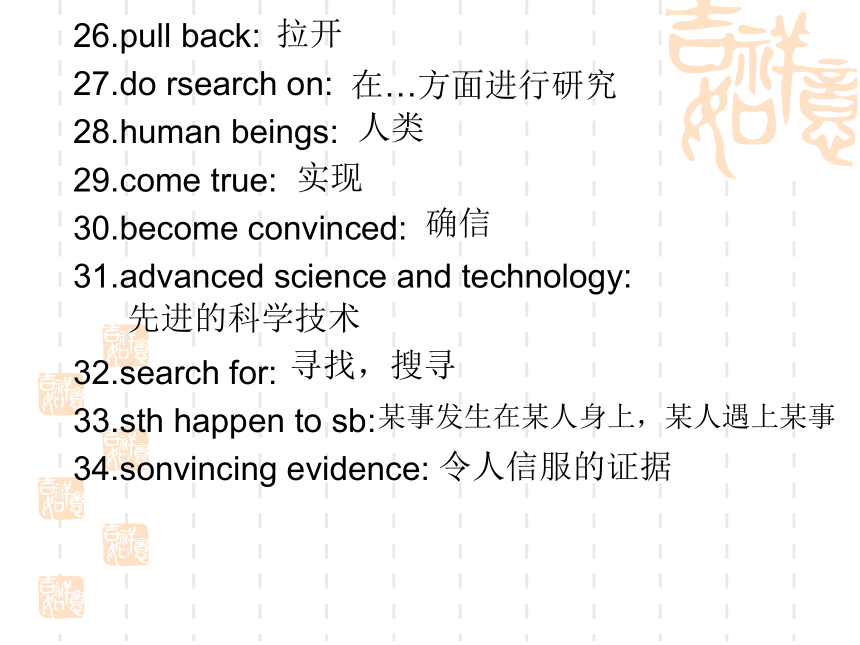
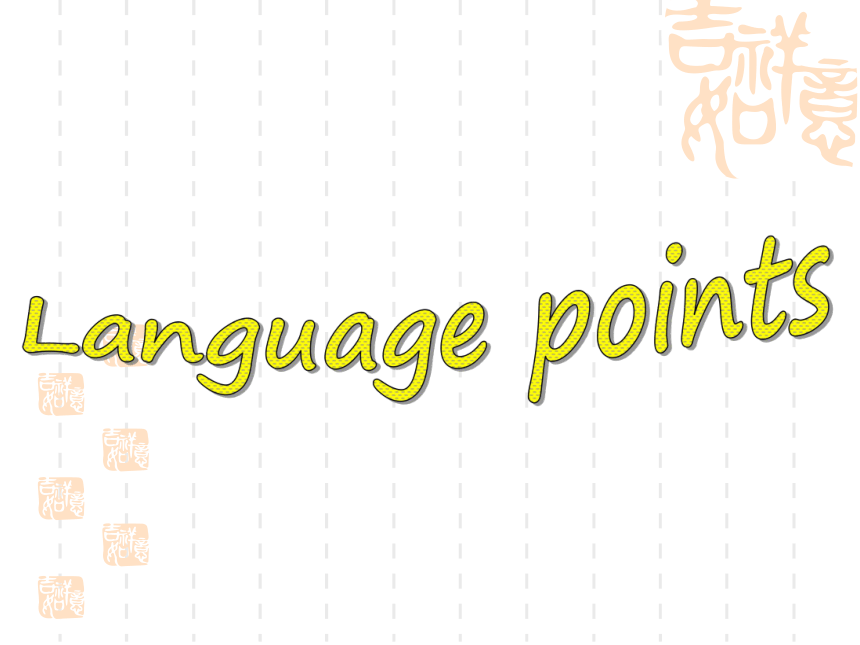
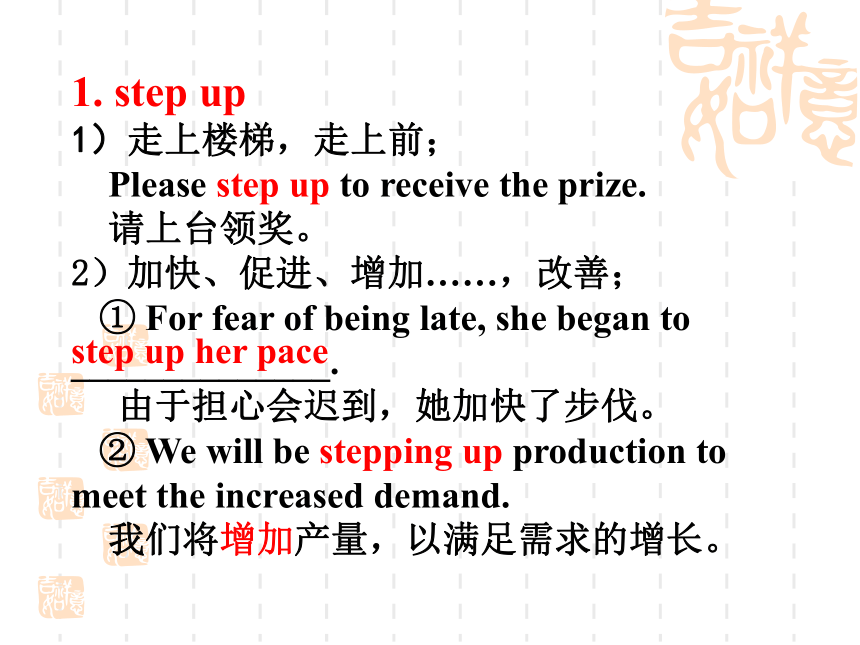
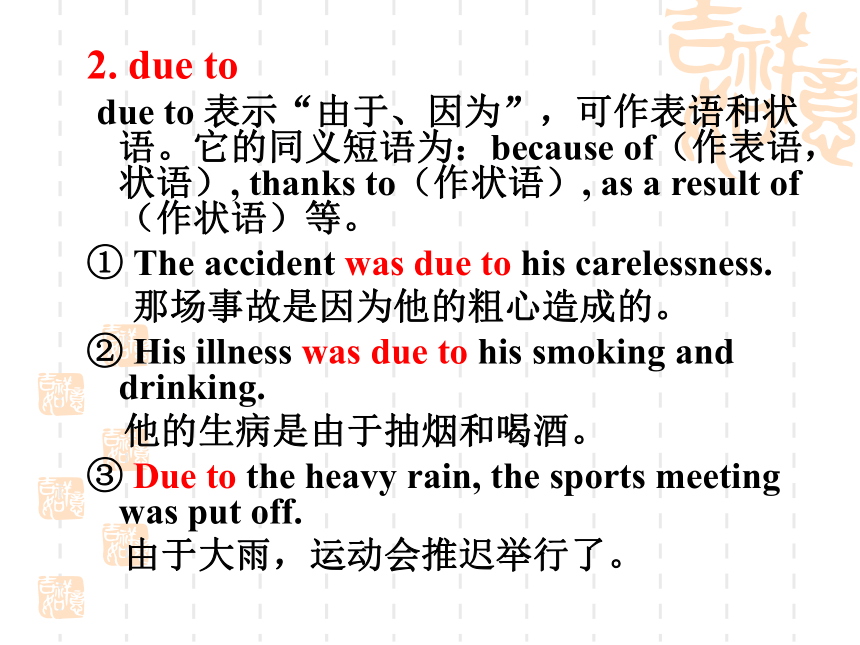
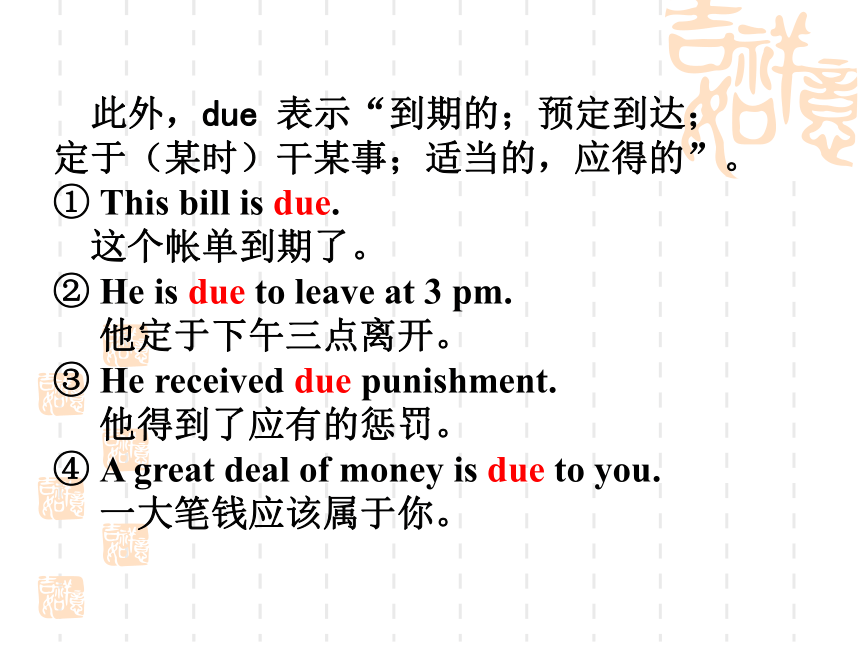
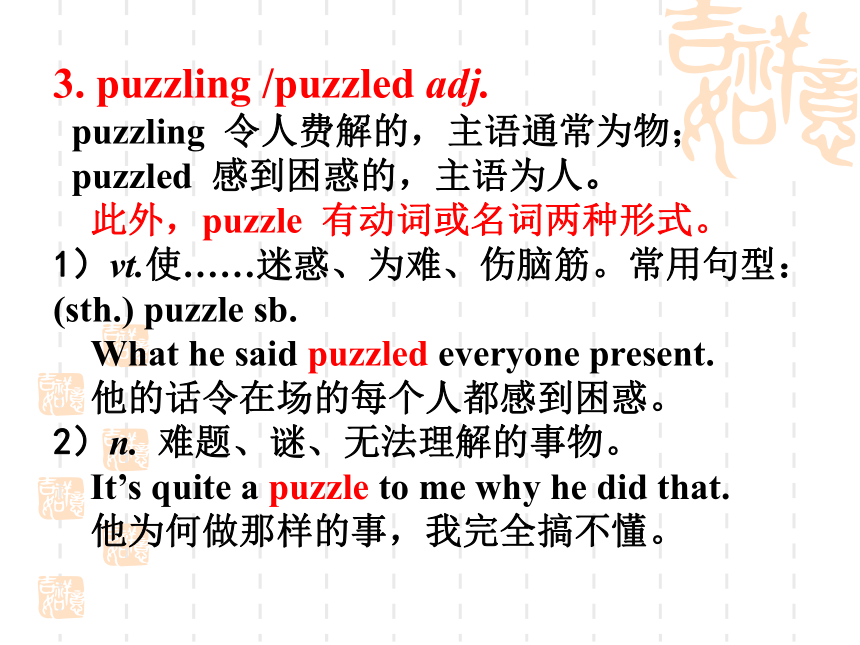
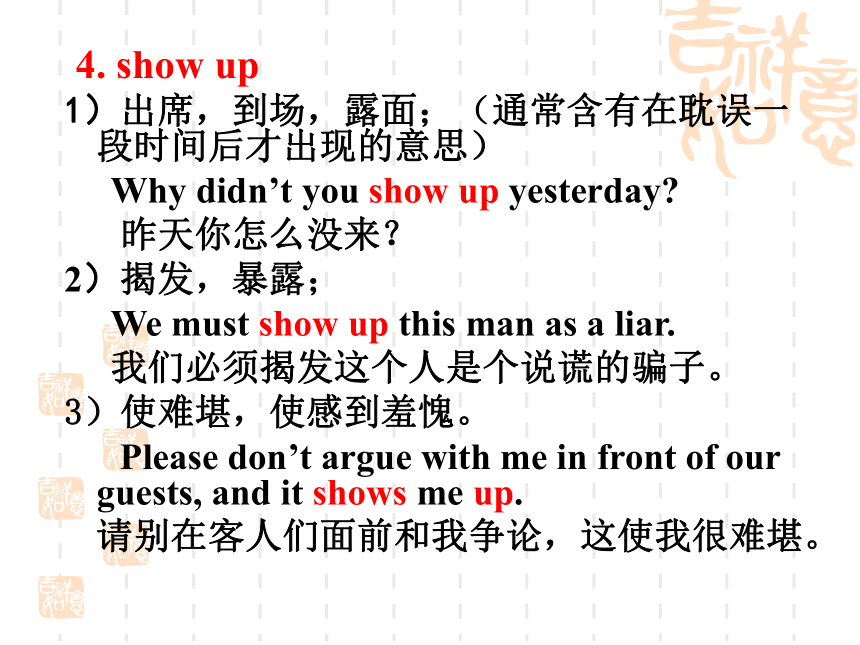
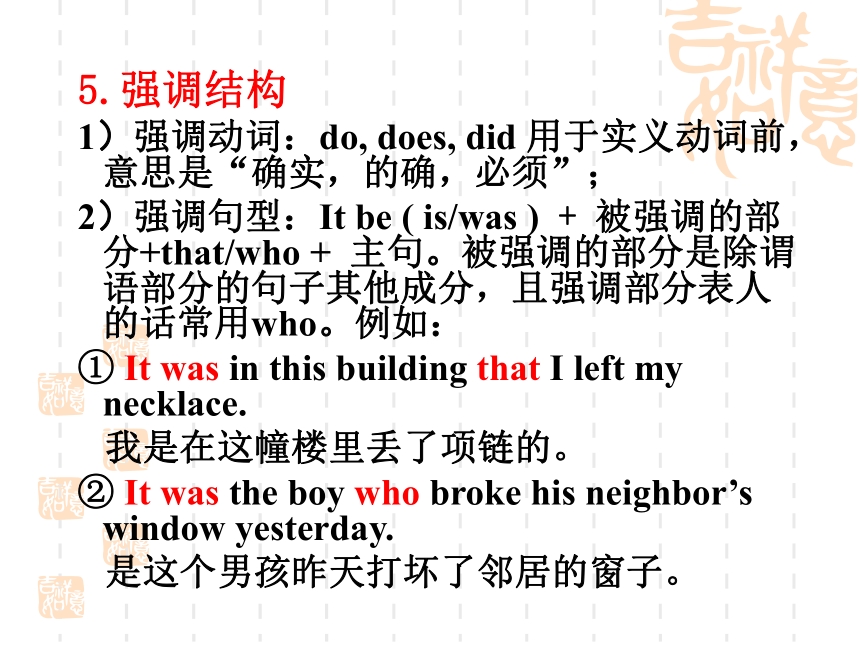
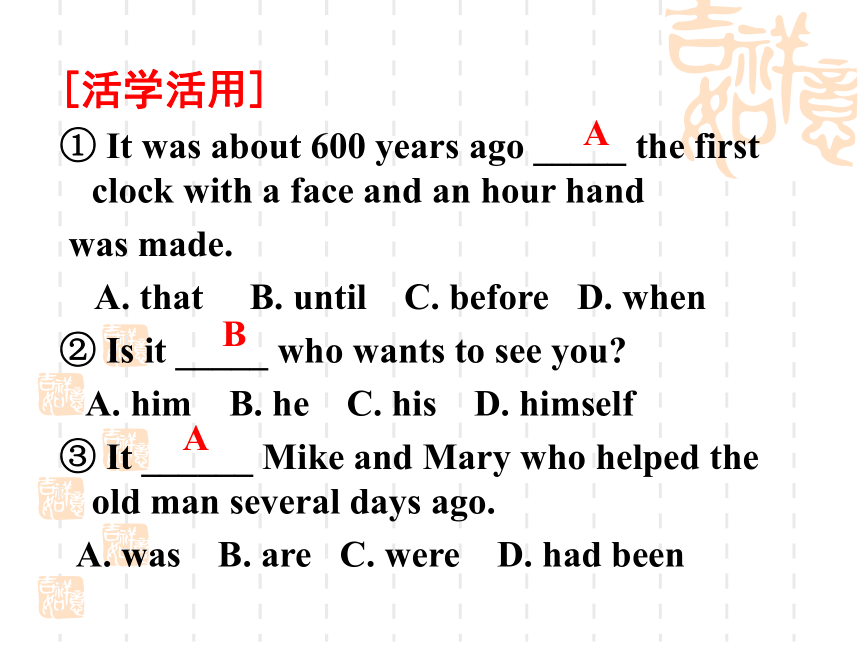
文档简介
课件67张PPT。Revision
Module 2
Unit 1 Tales of the unexplained
本单元重要词组1.run into:
2.step up:
3.due to:
4.put on:
5.rule out:
6.look into:
7.take charge of:
8.so far:
9.outer space:
10.on average:
11.cause sb/ sth to do:
12.make a speech:偶然遇到;撞着加速,加紧因为,由于播放,穿上,上演等排除调查负责,掌管到目前为止外层太空平均促使,引起作报告13.dream of/ about:
14.have the chance to do:
15.see…with one’s own eyes:
16.show great interest in:
17.believe in:
18.go missing:
19.show up :
20.according to:
21.stay out late:
22.make up:
23.make progress:
24.carry out:
25.run after:梦想,梦到有机会做某事亲眼看见对…表现出极大的兴趣信任,相信失踪出现,露面根据在外待到很晚编造,组成,弥补,化妆取得进步贯彻,执行;完成追赶26.pull back:
27.do rsearch on:
28.human beings:
29.come true:
30.become convinced:
31.advanced science and technology:
32.search for:
33.sth happen to sb:
34.sonvincing evidence:拉开在…方面进行研究人类实现确信先进的科学技术寻找,搜寻某事发生在某人身上,某人遇上某事令人信服的证据Language points1. step up
1)走上楼梯,走上前;
Please step up to receive the prize.
请上台领奖。
2)加快、促进、增加……,改善;
① For fear of being late, she began to ______________.
由于担心会迟到,她加快了步伐。
② We will be stepping up production to meet the increased demand.
我们将增加产量,以满足需求的增长。step up her pace 2. due to
due to 表示“由于、因为”,可作表语和状语。它的同义短语为:because of(作表语,状语), thanks to(作状语), as a result of(作状语)等。
① The accident was due to his carelessness.
那场事故是因为他的粗心造成的。
② His illness was due to his smoking and drinking.
他的生病是由于抽烟和喝酒。
③ Due to the heavy rain, the sports meeting was put off.
由于大雨,运动会推迟举行了。
此外,due 表示“到期的;预定到达; 定于(某时)干某事;适当的,应得的”。
① This bill is due.
这个帐单到期了。
② He is due to leave at 3 pm.
他定于下午三点离开。
③ He received due punishment.
他得到了应有的惩罚。
④ A great deal of money is due to you.
一大笔钱应该属于你。3. puzzling /puzzled adj.
puzzling 令人费解的,主语通常为物;
puzzled 感到困惑的,主语为人。
此外,puzzle 有动词或名词两种形式。
1)vt.使……迷惑、为难、伤脑筋。常用句型:(sth.) puzzle sb.
What he said puzzled everyone present.
他的话令在场的每个人都感到困惑。
2)n. 难题、谜、无法理解的事物。
It’s quite a puzzle to me why he did that.
他为何做那样的事,我完全搞不懂。 4. show up
1)出席,到场,露面;(通常含有在耽误一段时间后才出现的意思)
Why didn’t you show up yesterday?
昨天你怎么没来?
2)揭发,暴露;
We must show up this man as a liar.
我们必须揭发这个人是个说谎的骗子。
3)使难堪,使感到羞愧。
Please don’t argue with me in front of our guests, and it shows me up.
请别在客人们面前和我争论,这使我很难堪。5.强调结构
1)强调动词:do, does, did 用于实义动词前,意思是“确实,的确,必须”;
2)强调句型:It be ( is/was ) + 被强调的部分+that/who + 主句。被强调的部分是除谓语部分的句子其他成分,且强调部分表人的话常用who。例如:
① It was in this building that I left my necklace.
我是在这幢楼里丢了项链的。
② It was the boy who broke his neighbor’s window yesterday.
是这个男孩昨天打坏了邻居的窗子。[活学活用]
① It was about 600 years ago _____ the first clock with a face and an hour hand
was made.
A. that B. until C. before D. when
② Is it _____ who wants to see you?
A. him B. he C. his D. himself
③ It ______ Mike and Mary who helped the old man several days ago.
A. was B. are C. were D. had beenAB A6. witness
1)n. 目击者、见证人(与of/to连用;证据,证词,见证(与to连用);
① The police found the witness to the murder case.
警察找到了凶杀案的目击证人。
② His whole life is a witness to his honesty.
他的一生就是对他诚实品质的证明。
2)vt. 目击……、亲眼看到 = see
Did you witness the whole event?
你目击了整件事情吗?
7. That’s when the lights came.
这是when引导的表语从句,表语从句是说明主语的内容。
① The morning is when I’m busiest.
早上是我最忙的时候。
② That’s when the World War II broke out.
那时正是二次世界大战爆发的时候。
[思维拓展]
引导表语从句的关联词还有:that, whether, what, which, who, whose, where, why, how等,引导表语从句的关联词不省略。[活学活用]
① That is ______ I look at it.
这是我对这问题的看法。
② That is ______ you are wrong.
这就是你不对的地方。
③ The problem is ______ can be sent to replace him.
问题是能派谁去顶替他。
④ He is no longer ______ he was.
他已经不是以前的他了。
⑤ Your greatest fault is ______ you think too much of yourself.
你最大的缺点是过多想到自己。wherehowthatwhatwho8. according to 表示“按照,根据”
① According to our school rules, you are worthy of the reward.
根据我校的规则,你配受这奖励。
② Take the medicine according to the instructions on the bottle.
请根据瓶子上的说明服药。
[活学活用] _____, he should be punished.
A. On the law B. According to the law C. With the law D. By the law
B9.完全倒装
所谓完全倒装,就是将谓语动词置于主语前。通常把表语和地点状语放于句首,这样做是为了突出某人或物的特点。例如:
① Standing in the middle of the room was a young girl in white.
站在房间中间的是一个穿白衣服的年轻姑娘。
② Walking around the corner was a large policeman with his two dogs.
一个身材魁梧的警察带着两只警犬在街角走着。10.常见部分倒装
1)当具有否定意义的副词置于句首时,句子应用部分倒装,这类副词常有seldom, never, hardly, no sooner, few, little, by no means, at no time, in no way等。
① Hardly did I know anything about his character.
我对他的性格几乎一无所知。
② Nowhere could he be found.
什么地方都找不到他。
③ At no time have I said such a thing.
任何时候我都不会说这样的一件事的。
2) such /so….that 用来引导结果状语从句,如果so/such 放在句首,句子也用部分倒装形式。例如:
① He was so tired that he fell asleep as soon as he fell onto the bed.
他是那么累以至于一倒在床上就睡着了。
= So tired was he that he fell asleep as soon as he fell onto the bed.
② Such great progress did he make that he was praised.
他取得了如此大的进步以至于被表扬了。[活学活用]
① Such a stupid boy _______ that I don’t know how to deal with him.
A. he is B. was he C. is he D. he was
② So tired _____after walking such a long way that I _____ stand.
A. was I; could hardly B. did I, could hardly
C. was I; couldn’t hardly D. I was, could hardly
③ On the top of the hill _____where I once visited the monk.
A. a temple stands B. does a temple stand
C. a temple stands there D. stands a temple
④ The door opened and ______.
A. out Tom rushed B. out did Tom rush
C. Tom out rushed D. out rushed Tom
CDDA11.white-skinned: 白皮肤的
这是一个合成形容词,由“形容词+名词+ed”构成。此外,还可由 “形容词+名词+ing”构成.例如:
good-looking: 好看的,赏心悦目的
man-eating: 食人的
English-speaking: 说英语的
one-eyed: 独眼的,一只眼睛的
three-legged: 三条腿的
multi-colored: 多种颜色的
warm-blooded: 热血的, 热烈的12. happen 恰好,碰巧
It happens/happened that sb.… =Sb. happens/happened to do/be doing/have done….
① It happened that I had no money with me .
=I happened to have no money with me.
碰巧我身边没带钱。
② 我昨晚打电话给他时,他碰巧已出去了。
He happened to have gone out when I called him last night.
=It happened that he had gone out when I called him last night.13. get+adj./done
get done (dressed, drunk, changed, caught, paid, hurt)
① They are going to __________ on New Year’s Day.
他们要在元旦结婚。
② The foods are getting cold.
饭菜都凉了。
④ 这裙子脏了,该洗一洗了。
This skirt is getting dirty; it needs washing.
get married 14.rule out 排斥、否决、拒绝考虑
① We can’t rule out the possibility of failure.
我们不能排除失败的可能。
② That’s a possibility that can’t be ruled out.
那个可能性是不可被排除的。
③ The doctor took an X-ray to rule out the chance of broken bones.
为了排除骨折的可能性医生拍了X 光片。15. look into 注视……内部; 调查
[联想发散]
look about / around 四下环顾;朝四周看;
look back (on / upon / to ) 回顾;回想;
look down on / upon 俯视;轻视;瞧不起;
look forward to 盼望;带着希望等待;
look out (for) 小心;注意、留心……
look through 透过……看;大略的看一遍;
look after 照看, 照管。[活学活用]
①____! There is a train coming.
A. Look out B. Look around
C. Look forward D. Look on
② They were _____ the summer vacation.
A. looking down on B. looking out for
C. looking forward to D. looking into
③ The police have _____ the cause of the accident.
A. looked for B. looked out of
C. looked into D. looked forward to
④ Why does Tom want the detective to ______ the case?
A. look at B. look for
C. look into D. look up
ACCC16.run into
(1)(非正式)偶然遇到,碰见(某人)
① I first ran into him at the theatre.
我第一次遇见他是在剧院。
② I ran into an old friend in the street.
我在街上遇到一位老朋友。
(2)(汽车)撞到;与……相撞
The car ran into a lamppost.
汽车撞到路灯柱上。1. wild adj.
1) 野生的,荒凉的
More and more people like eating wild animals and plants.
越来越多的人喜欢吃野生动植物。
2) 缺乏管教的,无法无天的
The boy is wild and completely out of control.
这小孩缺乏管教,无法无天。[思维拓展]
in the wild 在野生环境中
be wild with joy 欣喜若狂
be wild about… 热衷于…,狂热 go wild 发疯
2.report 1)n. 报告、报道。常构成give / make / present / listen to a report结构。
I read a funny report in the paper today.
今天,我在报纸上读到了一篇有趣的报道。
2) vt. 报道。表示“向…报告…(report sb. /sth. to…)”。
① I will report such a thing to the headmaster.
我会把这件事告诉校长的。
② The girls reported him to the teacher for his smoking.
女同学向老师报告了他吸烟的事。
3.produce n. v. 生产production n. 生产,造成;
product n. 产品;
productive adj. 富有成效的,生产的,有生产力的;
productivity n. 生产力,生产效率;
agricultural production 农业生产。① Their efforts are not very productive even though they work hard.
尽管他们很努力,但是效率仍不是很高。
② Their efforts produce no results.
他们的努力没有什么结果。
4. similar adj. 相似的,类似的常用于be similar to(和……相似)或be similar in (在……方面相似)结构中。
① Your view on education are similar to mine.
你的教育观点和我类似。
② Our cars are similar in color.
我们的车子颜色相似。① Our bodies are strengthened by taking exercise. _____, our minds are developed by learning.
A. Possibly B. Likely
C. Similarly D. Generally
[活学活用]C② --- Do you have a _____coat?
--- Sure. I have the _____ coat as yours.
A. same, same B. same, similar
C. similar, similar D. similar, same
D 5. describe vt.
1) 描写,叙述……的特征,形容 describe sth to sb.
Words cannot describe her beauty.
言词无法形容她的美。
2) 评述
He described my plan as unrealistic.
他批评我的计划不切实际。description n.
give a (brief/full/detailed) description of
Please give me a brief description of the accident.
请简短地叙述这启意外事件给我听。6. It’s said that sb /sth… = Sb /Sth is/was said to do/be doing/have done据说要做……/正在做……/曾经做过……
He is said to be writing a book.
=It’s said that he is writing a book.
据说他正在写一本书。
可用于这种句型的单词还有report, expect, consider, suppose, believe,think 等。
It is reported/believed/thought that…= sb./sth. is reported / believed/thought to do
= people report/believe/think that据报道/人们相信/人们认为…
____ in the newspapers, the new president will take office next week.
It is reported
B. Which is reported
C. It is reporting
D. As is reported
[活学活用]D7. run after追赶、(口语)追求① The bus was full, but still some people were running after it.
汽车客满了,但有些人还在追赶它。
② The young man is running after the lady.
这小伙子在追求那个女士。9. strength n. 力量;实力,长处① a man of great strength
力气很大的人
② Chinese is his strength.
擅长中文是他的特长。
③ Tolerance is one of her many strengths.
宽容是他的一个优点。11.“情态动词+完成时”的虚拟用法1) must + have + p.p
2) may + have + p.p
3) can/could + have + done
4) should/ought to + 完成时
5) needn’t +完成时must have done表示对过去已经发生的行为推测,意为“想必/准是/一定是做了什么事”
The ground is wet. It must have rained last night.
地面很湿,昨晚肯定下雨了。
should have done用于肯定句时,表示“本应该做某事而实际上未做 ”;用于否定句时,则“表示不该做的事反而做了”。
You should have done this exercise more carefully.
你本应该更仔细地做练习。 Unit 1 Tales of the unexplained高一牛津版模块二Grammar and usage We use the present perfect to say that an action happened at an unspecified (未指明的) time before now. The exact time is not important.
Present Perfect Tense
Form of present perfect tenseWe form the present perfect tense with have (haven’t) /has (hasn’t) and the past participle of the verb.
Examples:
a. You have seen that movie many times.
b. Have you seen that movie many times?
c. You have not seen that movie many times. They bought this house three years ago.
They __________(live) here since then.have lived1. We ___________ ( study) Chinese for about four years.
2. My father__________ ( be) off work since last year.
3. Yao Ming __________ ( play) basketball in the US for a long time.
4. I ___________ (see) him since last Friday.
have studiedhas beenhas playedhaven’t seenExercises:
4. We use the present perfect tense
when the exact time of an action is not
clear or important.
We use it with time expressions such
as: already, ever, for, just, lately,
never, recently, since, yet.
ⅠWe use already for positive statements and yet for negative statements.
ⅡWe use for + a period of time and since + a point in time.
We use the present perfect continuous tense to show that something started in the past and has continued up until now.
Present Perfect Continuous
Tense We form the present perfect tense with have/has and the present participle of the verb.
has/have + been + 现在分词Form of present perfect
continuous tense You have been waiting here for two hours.
Examples: The man started working in the field half an hour ago, and he is still working now.
The man _______________ (work) in the field for half an hour. has been working The boy started having dinner five minutes ago. He is still having dinner now.
The boy ______________ (have) dinner since five minutes ago. has been havingUsages of present perfect continuous tense I have not been sleeping well since I returned home.
Examples:1.?We use the present perfect continuous
tense to talk about actions that started in
the past and are still continuing. I ________________( wait ) for an hour and he still hasn’t turned up.
have been waiting 4.We can use either a state verb or an
action verb with the present perfect tense
but we usually can only use an action verb with the present perfect continuous tense. ( ) I have never visited America.
( ) I have already been to America.
( ) I have never been visiting America.
√√× Examples 5.We use the present perfect tense, not the
present perfect continuous tense, with the
words like never, yet, already and ever.
( ) 1. Although he has lived with us for years, he _________ us much impression.
A. hadn’t left
B. didn’t leave
C. doesn’t leave
D. hasn’t left
ExercisesD( ) 2. ________ Dad and Vicky
________ married?
A. How long were, being
B. How long, have
C. How long have, been
D. How long did, get C( ) 3. How can you possibly miss the news? It ___________ on TV all day long.
A. has been
B. had been
C. was
D. will be
A ( ) 4.The old couple have been married for 40 years and never once ____ with each other.
A. they had quarreled
B. they have quarreled
C. have they quarreled
D. had they quarreled
C( ) 5. ---- How long _________
at the job?
---- Since 1990.
A. were you employed
B. have you been employed
C. had you been employed
D. will you been employed
B( ) 6. I wonder why Jenny ______ us recently. We should have heard from her by now.
A. hasn’t written
B. doesn’t write
C. won’t write
D. hadn’t written A
2.step up:
3.due to:
4.put on:
5.rule out:
6.look into:
7.take charge of:
8.so far:
9.outer space:
10.on average:
11.cause sb/ sth to do:
12.make a speech:偶然遇到;撞着加速,加紧因为,由于播放,穿上,上演等排除调查负责,掌管到目前为止外层太空平均促使,引起作报告13.dream of/ about:
14.have the chance to do:
15.see…with one’s own eyes:
16.show great interest in:
17.believe in:
18.go missing:
19.show up :
20.according to:
21.stay out late:
22.make up:
23.make progress:
24.carry out:
25.run after:梦想,梦到有机会做某事亲眼看见对…表现出极大的兴趣信任,相信失踪出现,露面根据在外待到很晚编造,组成,弥补,化妆取得进步贯彻,执行;完成追赶26.pull back:
27.do rsearch on:
28.human beings:
29.come true:
30.become convinced:
31.advanced science and technology:
32.search for:
33.sth happen to sb:
34.sonvincing evidence:拉开在…方面进行研究人类实现确信先进的科学技术寻找,搜寻某事发生在某人身上,某人遇上某事令人信服的证据Language points1. step up
1)走上楼梯,走上前;
Please step up to receive the prize.
请上台领奖。
2)加快、促进、增加……,改善;
① For fear of being late, she began to ______________.
由于担心会迟到,她加快了步伐。
② We will be stepping up production to meet the increased demand.
我们将增加产量,以满足需求的增长。step up her pace 2. due to
due to 表示“由于、因为”,可作表语和状语。它的同义短语为:because of(作表语,状语), thanks to(作状语), as a result of(作状语)等。
① The accident was due to his carelessness.
那场事故是因为他的粗心造成的。
② His illness was due to his smoking and drinking.
他的生病是由于抽烟和喝酒。
③ Due to the heavy rain, the sports meeting was put off.
由于大雨,运动会推迟举行了。
此外,due 表示“到期的;预定到达; 定于(某时)干某事;适当的,应得的”。
① This bill is due.
这个帐单到期了。
② He is due to leave at 3 pm.
他定于下午三点离开。
③ He received due punishment.
他得到了应有的惩罚。
④ A great deal of money is due to you.
一大笔钱应该属于你。3. puzzling /puzzled adj.
puzzling 令人费解的,主语通常为物;
puzzled 感到困惑的,主语为人。
此外,puzzle 有动词或名词两种形式。
1)vt.使……迷惑、为难、伤脑筋。常用句型:(sth.) puzzle sb.
What he said puzzled everyone present.
他的话令在场的每个人都感到困惑。
2)n. 难题、谜、无法理解的事物。
It’s quite a puzzle to me why he did that.
他为何做那样的事,我完全搞不懂。 4. show up
1)出席,到场,露面;(通常含有在耽误一段时间后才出现的意思)
Why didn’t you show up yesterday?
昨天你怎么没来?
2)揭发,暴露;
We must show up this man as a liar.
我们必须揭发这个人是个说谎的骗子。
3)使难堪,使感到羞愧。
Please don’t argue with me in front of our guests, and it shows me up.
请别在客人们面前和我争论,这使我很难堪。5.强调结构
1)强调动词:do, does, did 用于实义动词前,意思是“确实,的确,必须”;
2)强调句型:It be ( is/was ) + 被强调的部分+that/who + 主句。被强调的部分是除谓语部分的句子其他成分,且强调部分表人的话常用who。例如:
① It was in this building that I left my necklace.
我是在这幢楼里丢了项链的。
② It was the boy who broke his neighbor’s window yesterday.
是这个男孩昨天打坏了邻居的窗子。[活学活用]
① It was about 600 years ago _____ the first clock with a face and an hour hand
was made.
A. that B. until C. before D. when
② Is it _____ who wants to see you?
A. him B. he C. his D. himself
③ It ______ Mike and Mary who helped the old man several days ago.
A. was B. are C. were D. had beenAB A6. witness
1)n. 目击者、见证人(与of/to连用;证据,证词,见证(与to连用);
① The police found the witness to the murder case.
警察找到了凶杀案的目击证人。
② His whole life is a witness to his honesty.
他的一生就是对他诚实品质的证明。
2)vt. 目击……、亲眼看到 = see
Did you witness the whole event?
你目击了整件事情吗?
7. That’s when the lights came.
这是when引导的表语从句,表语从句是说明主语的内容。
① The morning is when I’m busiest.
早上是我最忙的时候。
② That’s when the World War II broke out.
那时正是二次世界大战爆发的时候。
[思维拓展]
引导表语从句的关联词还有:that, whether, what, which, who, whose, where, why, how等,引导表语从句的关联词不省略。[活学活用]
① That is ______ I look at it.
这是我对这问题的看法。
② That is ______ you are wrong.
这就是你不对的地方。
③ The problem is ______ can be sent to replace him.
问题是能派谁去顶替他。
④ He is no longer ______ he was.
他已经不是以前的他了。
⑤ Your greatest fault is ______ you think too much of yourself.
你最大的缺点是过多想到自己。wherehowthatwhatwho8. according to 表示“按照,根据”
① According to our school rules, you are worthy of the reward.
根据我校的规则,你配受这奖励。
② Take the medicine according to the instructions on the bottle.
请根据瓶子上的说明服药。
[活学活用] _____, he should be punished.
A. On the law B. According to the law C. With the law D. By the law
B9.完全倒装
所谓完全倒装,就是将谓语动词置于主语前。通常把表语和地点状语放于句首,这样做是为了突出某人或物的特点。例如:
① Standing in the middle of the room was a young girl in white.
站在房间中间的是一个穿白衣服的年轻姑娘。
② Walking around the corner was a large policeman with his two dogs.
一个身材魁梧的警察带着两只警犬在街角走着。10.常见部分倒装
1)当具有否定意义的副词置于句首时,句子应用部分倒装,这类副词常有seldom, never, hardly, no sooner, few, little, by no means, at no time, in no way等。
① Hardly did I know anything about his character.
我对他的性格几乎一无所知。
② Nowhere could he be found.
什么地方都找不到他。
③ At no time have I said such a thing.
任何时候我都不会说这样的一件事的。
2) such /so….that 用来引导结果状语从句,如果so/such 放在句首,句子也用部分倒装形式。例如:
① He was so tired that he fell asleep as soon as he fell onto the bed.
他是那么累以至于一倒在床上就睡着了。
= So tired was he that he fell asleep as soon as he fell onto the bed.
② Such great progress did he make that he was praised.
他取得了如此大的进步以至于被表扬了。[活学活用]
① Such a stupid boy _______ that I don’t know how to deal with him.
A. he is B. was he C. is he D. he was
② So tired _____after walking such a long way that I _____ stand.
A. was I; could hardly B. did I, could hardly
C. was I; couldn’t hardly D. I was, could hardly
③ On the top of the hill _____where I once visited the monk.
A. a temple stands B. does a temple stand
C. a temple stands there D. stands a temple
④ The door opened and ______.
A. out Tom rushed B. out did Tom rush
C. Tom out rushed D. out rushed Tom
CDDA11.white-skinned: 白皮肤的
这是一个合成形容词,由“形容词+名词+ed”构成。此外,还可由 “形容词+名词+ing”构成.例如:
good-looking: 好看的,赏心悦目的
man-eating: 食人的
English-speaking: 说英语的
one-eyed: 独眼的,一只眼睛的
three-legged: 三条腿的
multi-colored: 多种颜色的
warm-blooded: 热血的, 热烈的12. happen 恰好,碰巧
It happens/happened that sb.… =Sb. happens/happened to do/be doing/have done….
① It happened that I had no money with me .
=I happened to have no money with me.
碰巧我身边没带钱。
② 我昨晚打电话给他时,他碰巧已出去了。
He happened to have gone out when I called him last night.
=It happened that he had gone out when I called him last night.13. get+adj./done
get done (dressed, drunk, changed, caught, paid, hurt)
① They are going to __________ on New Year’s Day.
他们要在元旦结婚。
② The foods are getting cold.
饭菜都凉了。
④ 这裙子脏了,该洗一洗了。
This skirt is getting dirty; it needs washing.
get married 14.rule out 排斥、否决、拒绝考虑
① We can’t rule out the possibility of failure.
我们不能排除失败的可能。
② That’s a possibility that can’t be ruled out.
那个可能性是不可被排除的。
③ The doctor took an X-ray to rule out the chance of broken bones.
为了排除骨折的可能性医生拍了X 光片。15. look into 注视……内部; 调查
[联想发散]
look about / around 四下环顾;朝四周看;
look back (on / upon / to ) 回顾;回想;
look down on / upon 俯视;轻视;瞧不起;
look forward to 盼望;带着希望等待;
look out (for) 小心;注意、留心……
look through 透过……看;大略的看一遍;
look after 照看, 照管。[活学活用]
①____! There is a train coming.
A. Look out B. Look around
C. Look forward D. Look on
② They were _____ the summer vacation.
A. looking down on B. looking out for
C. looking forward to D. looking into
③ The police have _____ the cause of the accident.
A. looked for B. looked out of
C. looked into D. looked forward to
④ Why does Tom want the detective to ______ the case?
A. look at B. look for
C. look into D. look up
ACCC16.run into
(1)(非正式)偶然遇到,碰见(某人)
① I first ran into him at the theatre.
我第一次遇见他是在剧院。
② I ran into an old friend in the street.
我在街上遇到一位老朋友。
(2)(汽车)撞到;与……相撞
The car ran into a lamppost.
汽车撞到路灯柱上。1. wild adj.
1) 野生的,荒凉的
More and more people like eating wild animals and plants.
越来越多的人喜欢吃野生动植物。
2) 缺乏管教的,无法无天的
The boy is wild and completely out of control.
这小孩缺乏管教,无法无天。[思维拓展]
in the wild 在野生环境中
be wild with joy 欣喜若狂
be wild about… 热衷于…,狂热 go wild 发疯
2.report 1)n. 报告、报道。常构成give / make / present / listen to a report结构。
I read a funny report in the paper today.
今天,我在报纸上读到了一篇有趣的报道。
2) vt. 报道。表示“向…报告…(report sb. /sth. to…)”。
① I will report such a thing to the headmaster.
我会把这件事告诉校长的。
② The girls reported him to the teacher for his smoking.
女同学向老师报告了他吸烟的事。
3.produce n. v. 生产production n. 生产,造成;
product n. 产品;
productive adj. 富有成效的,生产的,有生产力的;
productivity n. 生产力,生产效率;
agricultural production 农业生产。① Their efforts are not very productive even though they work hard.
尽管他们很努力,但是效率仍不是很高。
② Their efforts produce no results.
他们的努力没有什么结果。
4. similar adj. 相似的,类似的常用于be similar to(和……相似)或be similar in (在……方面相似)结构中。
① Your view on education are similar to mine.
你的教育观点和我类似。
② Our cars are similar in color.
我们的车子颜色相似。① Our bodies are strengthened by taking exercise. _____, our minds are developed by learning.
A. Possibly B. Likely
C. Similarly D. Generally
[活学活用]C② --- Do you have a _____coat?
--- Sure. I have the _____ coat as yours.
A. same, same B. same, similar
C. similar, similar D. similar, same
D 5. describe vt.
1) 描写,叙述……的特征,形容 describe sth to sb.
Words cannot describe her beauty.
言词无法形容她的美。
2) 评述
He described my plan as unrealistic.
他批评我的计划不切实际。description n.
give a (brief/full/detailed) description of
Please give me a brief description of the accident.
请简短地叙述这启意外事件给我听。6. It’s said that sb /sth… = Sb /Sth is/was said to do/be doing/have done据说要做……/正在做……/曾经做过……
He is said to be writing a book.
=It’s said that he is writing a book.
据说他正在写一本书。
可用于这种句型的单词还有report, expect, consider, suppose, believe,think 等。
It is reported/believed/thought that…= sb./sth. is reported / believed/thought to do
= people report/believe/think that据报道/人们相信/人们认为…
____ in the newspapers, the new president will take office next week.
It is reported
B. Which is reported
C. It is reporting
D. As is reported
[活学活用]D7. run after追赶、(口语)追求① The bus was full, but still some people were running after it.
汽车客满了,但有些人还在追赶它。
② The young man is running after the lady.
这小伙子在追求那个女士。9. strength n. 力量;实力,长处① a man of great strength
力气很大的人
② Chinese is his strength.
擅长中文是他的特长。
③ Tolerance is one of her many strengths.
宽容是他的一个优点。11.“情态动词+完成时”的虚拟用法1) must + have + p.p
2) may + have + p.p
3) can/could + have + done
4) should/ought to + 完成时
5) needn’t +完成时must have done表示对过去已经发生的行为推测,意为“想必/准是/一定是做了什么事”
The ground is wet. It must have rained last night.
地面很湿,昨晚肯定下雨了。
should have done用于肯定句时,表示“本应该做某事而实际上未做 ”;用于否定句时,则“表示不该做的事反而做了”。
You should have done this exercise more carefully.
你本应该更仔细地做练习。 Unit 1 Tales of the unexplained高一牛津版模块二Grammar and usage We use the present perfect to say that an action happened at an unspecified (未指明的) time before now. The exact time is not important.
Present Perfect Tense
Form of present perfect tenseWe form the present perfect tense with have (haven’t) /has (hasn’t) and the past participle of the verb.
Examples:
a. You have seen that movie many times.
b. Have you seen that movie many times?
c. You have not seen that movie many times. They bought this house three years ago.
They __________(live) here since then.have lived1. We ___________ ( study) Chinese for about four years.
2. My father__________ ( be) off work since last year.
3. Yao Ming __________ ( play) basketball in the US for a long time.
4. I ___________ (see) him since last Friday.
have studiedhas beenhas playedhaven’t seenExercises:
4. We use the present perfect tense
when the exact time of an action is not
clear or important.
We use it with time expressions such
as: already, ever, for, just, lately,
never, recently, since, yet.
ⅠWe use already for positive statements and yet for negative statements.
ⅡWe use for + a period of time and since + a point in time.
We use the present perfect continuous tense to show that something started in the past and has continued up until now.
Present Perfect Continuous
Tense We form the present perfect tense with have/has and the present participle of the verb.
has/have + been + 现在分词Form of present perfect
continuous tense You have been waiting here for two hours.
Examples: The man started working in the field half an hour ago, and he is still working now.
The man _______________ (work) in the field for half an hour. has been working The boy started having dinner five minutes ago. He is still having dinner now.
The boy ______________ (have) dinner since five minutes ago. has been havingUsages of present perfect continuous tense I have not been sleeping well since I returned home.
Examples:1.?We use the present perfect continuous
tense to talk about actions that started in
the past and are still continuing. I ________________( wait ) for an hour and he still hasn’t turned up.
have been waiting 4.We can use either a state verb or an
action verb with the present perfect tense
but we usually can only use an action verb with the present perfect continuous tense. ( ) I have never visited America.
( ) I have already been to America.
( ) I have never been visiting America.
√√× Examples 5.We use the present perfect tense, not the
present perfect continuous tense, with the
words like never, yet, already and ever.
( ) 1. Although he has lived with us for years, he _________ us much impression.
A. hadn’t left
B. didn’t leave
C. doesn’t leave
D. hasn’t left
ExercisesD( ) 2. ________ Dad and Vicky
________ married?
A. How long were, being
B. How long, have
C. How long have, been
D. How long did, get C( ) 3. How can you possibly miss the news? It ___________ on TV all day long.
A. has been
B. had been
C. was
D. will be
A ( ) 4.The old couple have been married for 40 years and never once ____ with each other.
A. they had quarreled
B. they have quarreled
C. have they quarreled
D. had they quarreled
C( ) 5. ---- How long _________
at the job?
---- Since 1990.
A. were you employed
B. have you been employed
C. had you been employed
D. will you been employed
B( ) 6. I wonder why Jenny ______ us recently. We should have heard from her by now.
A. hasn’t written
B. doesn’t write
C. won’t write
D. hadn’t written A
